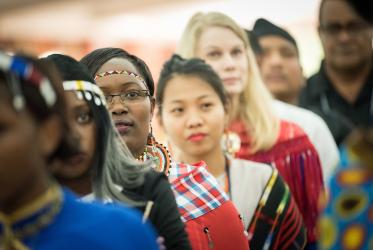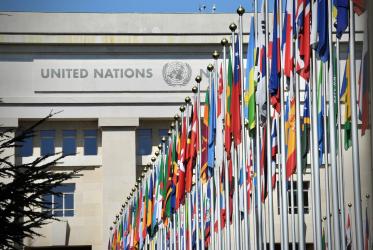A group of activists from Manipur, India, visited the World Council of Churches (WCC) headquarters in Geneva, Switzerland on 26 March, sharing accounts of human rights violations in their region and efforts to lobby against the Armed Forces Special Powers Act (AFSPA) at the 25th session of the United Nations Human Rights Council.
The group told of the on-going conflict in Manipur, a state in North Eastern India, where they said the AFSPA has been used in extrajudicial killings on charges of offense against the state. The AFSPA stems from colonial time and has been adopted by independent India. The Act grants the Indian security forces special powers, among them to kill or detained any suspects without due process.
The group of activists included Nobo Urikhimbam, Lheikhochin Haokip Mangvung Hechin and Sobita Mangsatabam, from the United NGOs Mission-Manipur (UNMM), who participated in the meeting hosted by the WCC programme for the Just and Inclusive Communities.
Urikhimbam, UNMMs’ secretary, said that since 2004 more than 4,000 people have been killed and many have been jailed and tortured by the Indian security forces. Due to political turmoil in the state, the number of extrajudicial executions has been significantly high, he said.
The government of India until now has been unable to resolve the conflict, he added.
Urikhimbam stressed the importance of interventions from the UN mechanisms in responding to this situation. He mentioned the report A Memorandum on Extrajudicial, Arbitrary or Summary Executions to Christof Heyns, Special Rapporteur on extrajudicial, summary or arbitrary executions, submitted by the Civil Society Coalition on Human Rights.
UNMM’s Sobita Mangsatabam highlighted the plight of women in Manipur, whom she said remain the leading victims of the conflict. She said that women are often abused by the security forces, and sexual exploitation and rape of women is used as a weapon of war.
Mangsatabam added that serious investigations into these violations of human rights should be conducted and perpetrators should be brought to justice.
The conflict in Manipur, which was among the issues discussed at the WCC 10th Assembly in Busan, Republic of Korea, needs more attention from the churches, the activists urged. The National Council of Churches in India is an important actor and can make significant contributions for peace-building efforts in Manipur, they said.







